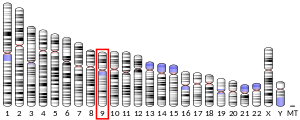AKNA
AKNA is a protein that in humans is encoded by the AKNA gene. The protein is an AT-hook transcription factor which contains an AT-hook binding motif. The protein is expressed as different isoforms. AKNA is known to upregulate expression of the receptor CD40 and its ligand CD40L/CD154.[5][6]
AKNA is an essential part in the construction, organization, and proliferation of the centrosomal microtubules in order to maintain the neural stem cells during the process of neurogenesis.[7][8] Due to these functions AKNA plays in the centrosomal microtubules it also has an active role in delamination during the formation of the subventricular zone, and the regulation of the amount of access provided to cells in this zone.[7][9] Furthermore, because of AKNA's role in the centrosomal microtubules it also plays a part in the management of the modification of epithelial cells losing their polarity and attachment, and transforming into the mobile mesenchymal stem cells, epithelial-mesenchymal transition (EMT).[5][9] This occurs because the alongside the increase in centrosomal microtubules both nucleation factors and minus end stabilizers are also increasing, causing the apical endfoot to have its constriction regulated because this affects the microtubules found at adherens junctions.[5][9][10]
Etymology
AKNA derives its name from the word "mother" in Inuit and Mayan language, and it's link to their mythology.[11] For in Inuit and Mayan culture AKNA is the "goddess of fertility and childbirth".[11] This connection is made from the observations of what occurs to mice that are missing the AKNA protein. In mice lacking AKNA their body very rapidly enters an increasing weakened state, very similarly to as if they did not have a mother to support them, and are not likely to live longer than 10 day's.[11]
In humans
The AKNA protein in humans has been found to be associated with cervical cancer. This is due to it being located on the 9q32 chromosome, in the FRA9E region. It is not uncommon for this chromosome to play a role in neoplasm and inflammatory diseases because how frequently it undergoes loss of function.[11][12][13]
References
- ^ a b c GRCh38: Ensembl release 89: ENSG00000106948 – Ensembl, May 2017
- ^ a b c GRCm38: Ensembl release 89: ENSMUSG00000039158 – Ensembl, May 2017
- ^ "Human PubMed Reference:". National Center for Biotechnology Information, U.S. National Library of Medicine.
- ^ "Mouse PubMed Reference:". National Center for Biotechnology Information, U.S. National Library of Medicine.
- ^ a b c "AKNA - Microtubule organization protein AKNA - Homo sapiens (Human) - AKNA gene & protein". www.uniprot.org. Retrieved 2020-05-01.
- ^ Siddiqa A, Sims-Mourtada JC, Guzman-Rojas L, Rangel R, Guret C, Madrid-Marina V, et al. (March 2001). "Regulation of CD40 and CD40 ligand by the AT-hook transcription factor AKNA". Nature. 410 (6826): 383–7. Bibcode:2001Natur.410..383S. doi:10.1038/35066602. PMID 11268217. S2CID 4382025.
- ^ a b Camargo Ortega G, Falk S, Johansson PA, Peyre E, Broix L, Sahu SK, et al. (March 2019). "The centrosome protein AKNA regulates neurogenesis via microtubule organization". Nature. 567 (7746): 113–117. Bibcode:2019Natur.567..113C. doi:10.1038/s41586-019-0962-4. hdl:2268/243318. PMID 30787442. S2CID 67770377.
- ^ "AKNA protein expression summary - The Human Protein Atlas". www.proteinatlas.org. Retrieved 2020-05-01.
- ^ a b c "AKNA Gene - GeneCards | AKNA Protein | AKNA Antibody". www.genecards.org. Retrieved 2020-05-01.
- ^ "AKNA (human)". www.phosphosite.org. Retrieved 2020-05-01.
- ^ a b c d Moliterno AR, Resar LM (November 2011). "AKNA: another AT-hook transcription factor "hooking-up" with inflammation". Cell Research. 21 (11): 1528–30. doi:10.1038/cr.2011.96. PMC 3365640. PMID 21670742.
- ^ Manzo-Merino J, Lagunas-Martínez A, Contreras-Ochoa CO, Lizano M, Castro-Muñoz LJ, Calderón-Corona C, et al. (December 2018). "The Human Papillomavirus (HPV) E6 Oncoprotein Regulates CD40 Expression via the AT-Hook Transcription Factor AKNA". Cancers. 10 (12): 521. doi:10.3390/cancers10120521. PMC 6316281. PMID 30562965.
- ^ Song Y, Pan Y, Liu J (2019-08-06). "The relevance between the immune response-related gene module and clinical traits in head and neck squamous cell carcinoma". Cancer Management and Research. 11: 7455–7472. doi:10.2147/CMAR.S201177. PMC 6689548. PMID 31496804.



